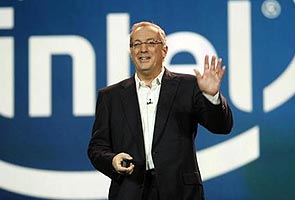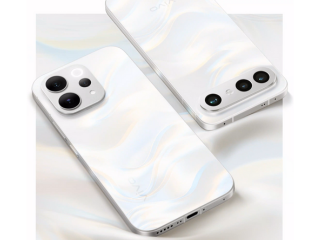- Home
- Mobiles
- Mobiles News
- Intel getting awfully good reviews for their first phones, says CEO
Intel getting awfully good reviews for their first phones, says CEO
By Reuters | Updated: 5 June 2012 12:07 IST

Click Here to Add Gadgets360 As A Trusted Source

Advertisement
Intel Chief Executive Paul Otellini showcased the top chipmaker's long-awaited push into smartphones and talked up ultrathin laptops he hopes will spice up a category that seems increasingly dull compared to tablets and other mobile devices.
With worldwide PC sales barely growing, Intel Corp has been racing to find a foothold in smartphone and tablet markets, where processors based on ARM Holdings Pls's power-efficient chip designs are widely used.
Last month in India, Lava International launched the first smartphone using Intel's new Medfield processor and the device has received respectable reviews from benchmark testers.
Intel has also announced the Medfield chips would be used in upcoming phones from Motorola Mobility Holdings Inc, Lenovo Group Ltd ZTE and Orange.
"We're getting awfully good reviews for our first phones," Otellini told investors at an annual Intel event. "We have ambitions; you'll see more announcements over time and very cool capabilities built into phones."
Many investors are waiting to see how successful the new handsets become with consumers before declaring that the chipmaker is a serious player in the mobile market. But growing expectations that Intel will be able to compete have fueled gains in its shares in recent months.
Intel is also heavily promoting a PC category it has dubbed ultrabooks, similar to Apple Inc's Macbook Air and offering some of the technological chic the iPad and other tablets epitomize.
Some investors are concerned that the expensive components used in them, such as solid-state drives, make them too pricey for many consumers. They worry Intel may sacrifice profit margins on sales of its processors to help make ultrabooks affordable.
Otellini said sales were on track and would pick up in the second half of 2012 as more manufacturers start using Intel's new Ivy Bridge processor.
"We're on track to meet our goal of 40 percent of consumer notebooks this holiday season being ultrabooks," Otellini said.
Last month, Intel posted quarterly earnings that failed to inspire gains in its recently high-flying stock and also said costs associated with ramping up new production lines for the Ivy Bridge chips would hurt gross margins more than expected.
Otellini said manufacturers are working on 20 tablets using Intel processors and Microsoft's long-awaited Windows 8 platform, expected later this year.
He also forecast that Intel, with its deep pockets, would become one of an increasingly smaller group of leading-edge chip manufacturers as the sector moves toward larger and costlier factories.
With the industry preparing to increase the size of the silicon wafers it uses, letting manufacturers fit more chips on each, future leading-edge factories will cost over $10 billion each to build, compared with about $5 billion now, Otellini added.
With worldwide PC sales barely growing, Intel Corp has been racing to find a foothold in smartphone and tablet markets, where processors based on ARM Holdings Pls's power-efficient chip designs are widely used.
Last month in India, Lava International launched the first smartphone using Intel's new Medfield processor and the device has received respectable reviews from benchmark testers.
Intel has also announced the Medfield chips would be used in upcoming phones from Motorola Mobility Holdings Inc, Lenovo Group Ltd ZTE and Orange.
"We're getting awfully good reviews for our first phones," Otellini told investors at an annual Intel event. "We have ambitions; you'll see more announcements over time and very cool capabilities built into phones."
Many investors are waiting to see how successful the new handsets become with consumers before declaring that the chipmaker is a serious player in the mobile market. But growing expectations that Intel will be able to compete have fueled gains in its shares in recent months.
Intel is also heavily promoting a PC category it has dubbed ultrabooks, similar to Apple Inc's Macbook Air and offering some of the technological chic the iPad and other tablets epitomize.
Some investors are concerned that the expensive components used in them, such as solid-state drives, make them too pricey for many consumers. They worry Intel may sacrifice profit margins on sales of its processors to help make ultrabooks affordable.
Otellini said sales were on track and would pick up in the second half of 2012 as more manufacturers start using Intel's new Ivy Bridge processor.
"We're on track to meet our goal of 40 percent of consumer notebooks this holiday season being ultrabooks," Otellini said.
Last month, Intel posted quarterly earnings that failed to inspire gains in its recently high-flying stock and also said costs associated with ramping up new production lines for the Ivy Bridge chips would hurt gross margins more than expected.
Otellini said manufacturers are working on 20 tablets using Intel processors and Microsoft's long-awaited Windows 8 platform, expected later this year.
He also forecast that Intel, with its deep pockets, would become one of an increasingly smaller group of leading-edge chip manufacturers as the sector moves toward larger and costlier factories.
With the industry preparing to increase the size of the silicon wafers it uses, letting manufacturers fit more chips on each, future leading-edge factories will cost over $10 billion each to build, compared with about $5 billion now, Otellini added.
© Thomson Reuters 2012
Comments
Get your daily dose of tech news, reviews, and insights, in under 80 characters on Gadgets 360 Turbo. Connect with fellow tech lovers on our Forum. Follow us on X, Facebook, WhatsApp, Threads and Google News for instant updates. Catch all the action on our YouTube channel.
Related Stories
Popular on Gadgets
- Samsung Galaxy Unpacked 2026
- iPhone 17 Pro Max
- ChatGPT
- iOS 26
- Laptop Under 50000
- Smartwatch Under 10000
- Apple Vision Pro
- Oneplus 12
- OnePlus Nord CE 3 Lite 5G
- iPhone 13
- Xiaomi 14 Pro
- Oppo Find N3
- Tecno Spark Go (2023)
- Realme V30
- Best Phones Under 25000
- Samsung Galaxy S24 Series
- Cryptocurrency
- iQoo 12
- Samsung Galaxy S24 Ultra
- Giottus
- Samsung Galaxy Z Flip 5
- Apple 'Scary Fast'
- Housefull 5
- GoPro Hero 12 Black Review
- Invincible Season 2
- JioGlass
- HD Ready TV
- Latest Mobile Phones
- Compare Phones
Latest Gadgets
- Tecno Pova Curve 2 5G
- Lava Yuva Star 3
- Honor X6d
- OPPO K14x 5G
- Samsung Galaxy F70e 5G
- iQOO 15 Ultra
- OPPO A6v 5G
- OPPO A6i+ 5G
- Asus Vivobook 16 (M1605NAQ)
- Asus Vivobook 15 (2026)
- Brave Ark 2-in-1
- Black Shark Gaming Tablet
- boAt Chrome Iris
- HMD Watch P1
- Haier H5E Series
- Acerpure Nitro Z Series 100-inch QLED TV
- Asus ROG Ally
- Nintendo Switch Lite
- Haier 1.6 Ton 5 Star Inverter Split AC (HSU19G-MZAID5BN-INV)
- Haier 1.6 Ton 5 Star Inverter Split AC (HSU19G-MZAIM5BN-INV)
© Copyright Red Pixels Ventures Limited 2026. All rights reserved.





![[Partner Content] OPPO Reno15 Series: AI Portrait Camera, Popout and First Compact Reno](https://www.gadgets360.com/static/mobile/images/spacer.png)










